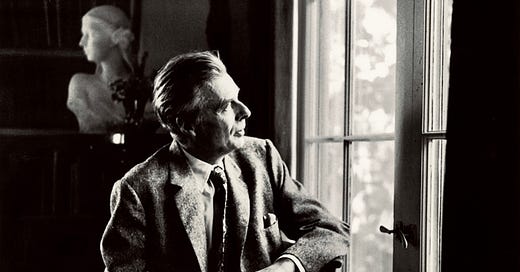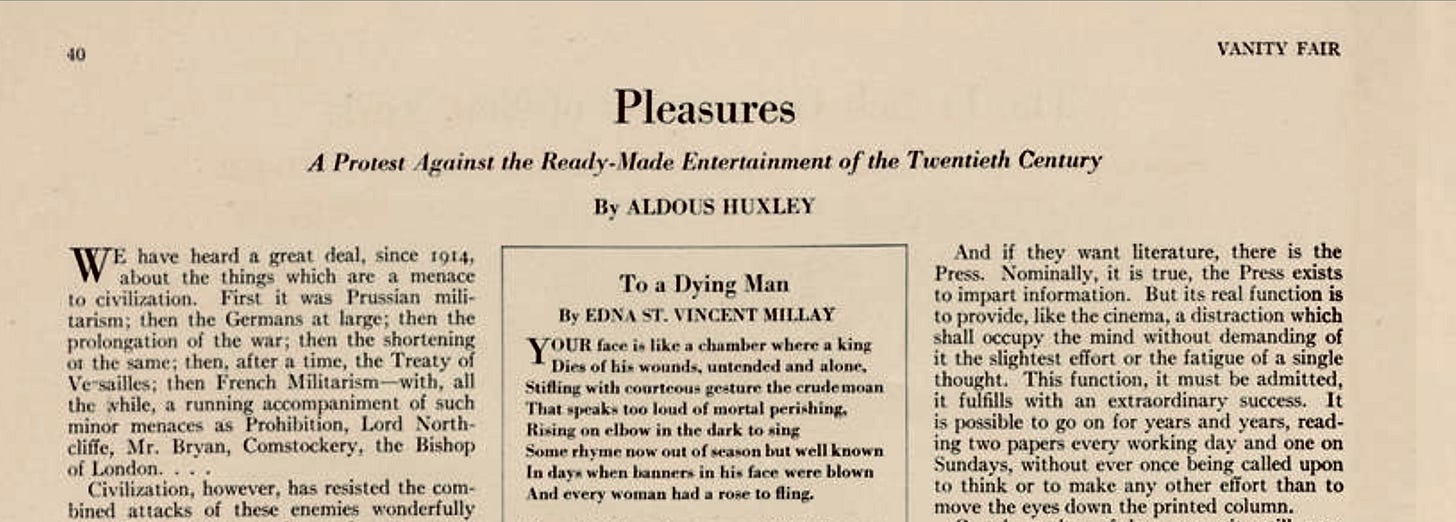Auto-Intoxication: Aldous Huxley on the Art of Deep Rest
(A Protest Against the Ready-Made Entertainment of the Twenty(first)-Century)
Hello friends,
All the threats that lurk over humanity can be traced back to the same source - the slow decay of our inner lives.
We watch modern wars, for example, as ancient Romans watched gladiator fights. We cheer to the side we support, shout how unjust our ‘fighter’ is treated by our opponents, and refuse to admit that the person on the other side is human like us. Once the fight begins to bore us, we demand the end of it and the beginning of another. Romans did this from the safety of their seats at the Colosseum, we do the same from the comfort of our screens.
There is a reason why the Roman emperor Marcus Aurelius banned all gladiator fights despite their popularity. He believed that such leisure and such entertainment degrade our soul and spirit; while Seneca, another Stoic philosopher, advised his friend to avoid such crowds as they made him ‘more cruel and inhumane’.
… the dangers which confront our civilisation are not so much the external dangers—wild men, wars and the bankruptcy that wars bring after them. The most alarming dangers are those which menace it from within, that threaten the mind rather than the body and estate of contemporary man…
… wrote Aldous Huxley in his prophetic essay for Vanity Fair1. Huxley wrote that genuine individuality faces a fast decay because of modern ready-made entertainment. He thought that the technological progress that we’ve made has merely provided us with more efficient means for going backwards.
Of all the various poisons which modern civilisation, by a process of auto-intoxication, brews quietly up within its own bowels, few, it seems to me, are more deadly (while none appears more harmless) than that curious and appalling thing that is technically known as 'pleasure'.
In the next sentence, Huxley jokingly admits that he, as any normal person, abominates work, but what he dislikes more is how the modern man spends time when he is off work.
‘The horrors of modern 'pleasure' arise from the fact that every kind of organised distraction tends to become progressively more and more imbecile.’ What Huxley witnessed in 1923 (this was when this essay was written) was the rise of ready-made distractions for the masses. The mortal danger of them is that they make us passive and senile, they kill our individuality and atrophy our minds.
Nothing illustrates this idea better than the origin of the word comfort. The root of the word is ‘fortis’ or ‘strengthening, support, consolation’. The original meaning of comfort was rest that prepares you for action, not the meaningless and passive Netflix entertainment.
The true rest requires an effort on our part. The true rest reinvigorates us for life, strengthens us, and consoles us. Dante, the author of Divine Comedy, used to write humorous (often vulgar) poetry to his friends for fun. In one of his vulgar poems, he advised his namesake ‘to give his testicles a good wash to see if that would clear his head’2
Seneca the Elder, the father of my favourite philosopher Seneca, was a prominent orator. As a teenager, the father took part in what was called declamatio (declamation), or short debates on fictional topics. This was a way of having fun, but also a good exercise for sharpening their wits. 3
You might think that such activities were limited to the wealthy, but Huxley brings his examples:
Royal personages were not the only people who enjoyed intelligent pleasures. In Elizabethan times every lady and gentleman of ordinary culture could be relied upon, at demand, to take his or her part in a madrigal or a motet. Those who know the enormous complexity and subtlety of sixteenth century music will realize what this means.
To indulge in their favorite pastime our ancestors had to exert their minds to an uncommon degree.
Even the completely uneducated vulgar people ‘delighted in pleasures requiring the exercise of a certain intelligence, individuality and personal initiative. They listened, for example, to Othello, King Lear and Hamlet—apparently with pleasure and comprehension. They sang and made much music.’
Personal initiative, individualism, and intelligence stand at the core of true rest, according to Huxley. When our ancestors used to sing songs they wrote they practiced true leisure; when we passively scroll social-media feeds we engage in auto-intoxication. The old pleasures demanded an effort from us, they pushed us to exercise our intelligence and use our personal initiative. Today we have replaced this with vast organisations that produce ready-made distractions available on demand, ‘distractions which demand from pleasure seekers no personal participation and no intellectual effort of any sort.’
Huxley was truly a dystopian prophet. His essay for Vanity Fair was published back in 1923 or 101 years ago. Geniuses refuse to be compared, but I always thought that a Huxleyan dystopia was more likely than an Orwellian nightmare. (Although sometimes the former doesn’t exclude the latter).
Self-poisoned in this fashion, civilization looks as though it might easily decline into a kind of premature senility.
With a mind almost atrophied by lack of use, unable to entertain itself and grown so wearily uninterested in the ready-made distractions offered from without that nothing but the grossest stimulants of an ever-increasing violence and crudity can move it, the democracy of the future will sicken of a mortal boredom.
I felt that senility approaching my mind at one point in my life. What shaped my identity when I was a teenager was my taste in music. Rock genre and metalheads were my tribe and I spent all my leisure time listening to my favourite bands. But as I was growing up I came to realise that although I love music, I don’t participate in it in any meaningful way. My hobby was a passive hobby. I had no talent for playing instruments, let alone creating my own music. As time passed, I was getting bored of spending my leisure in this way. (Since then many things changed. I became more engaged with music, particularly, when it comes to classical music. I still can’t play any instruments, but I can enjoy it more deeply).
I think this is what Huxley (partially) implied in his piece. Passive leisure never fully reinvigorates us. In my case, I always craved a new song, a new album, or a new band. The satisfaction was always ephemeral, short term, and temporary.
Interestingly enough, the decline of the Roman civilisation came in parallel with the rise of gladiator fights and cheap entertainment. ‘Their deadly ennui demanded ever more gladiators, more tight-rope-walking elephants, more rare and far-fetched animals to be slaughtered.’
In other words, Marcus Aurelius was correct when he banned violent fights at the Colosseum. He knew that his fellow emperors used such passive entertainment to sedate people, to distract them from life. A population with no individuality, no inner-lives, no personal initiative, and sedated by cheap entertainment cannot forge conscious revolutions or pose any threat to the powerful for that matter.
As always - Confide tibimet.
Proofread and edited by Lisa Statler
Do you want to keep a journal?
I’ve been journaling for the past 15 years of my life. By saying this I mean that for the past decade and a half, I’ve been sitting down, consistently, every day, and writing my thoughts and ideas into my notebook.
If you would like to begin your journaling journey, but don’t know where to start, how to stay consistent, or which type of journaling suits you, consider subscribing to my Patreon page.
I’ve made several ‘Guided journaling’ videos, where we sit down and journal together, I give journaling tips based on science, and I share some very personal pieces of advice based on my own journey.
Aldous Huxley for Vanity Fair, 1923
Barbara Reynolds, Dante: A life, 2006
Emily Wilson, Seneca, 2015








As I was reading this article I remembered all I had ever read about cock fighting, bear baiting, chariot races, dog fighting, and the myriad of professional sports where billionaire owners pay millionaire players while fans play hundreds for tickets to games. And kids play a myriad of video games where murder is the objective. (I am no purist; I let my grandsons play them when they are here.) 🤨
A few years ago I went to Dublin with my brother. One day we were in a crowded pub, how unusual is THAT, and the Irish Derby was on TV. When the horses met the first hedge and water hazard, the crowd roar was deafening as horses stumbled and threw their riders. I instantly thought of American NASCAR fans watching raptly as cars collided on the track.
We love our distractions wherever we find them.